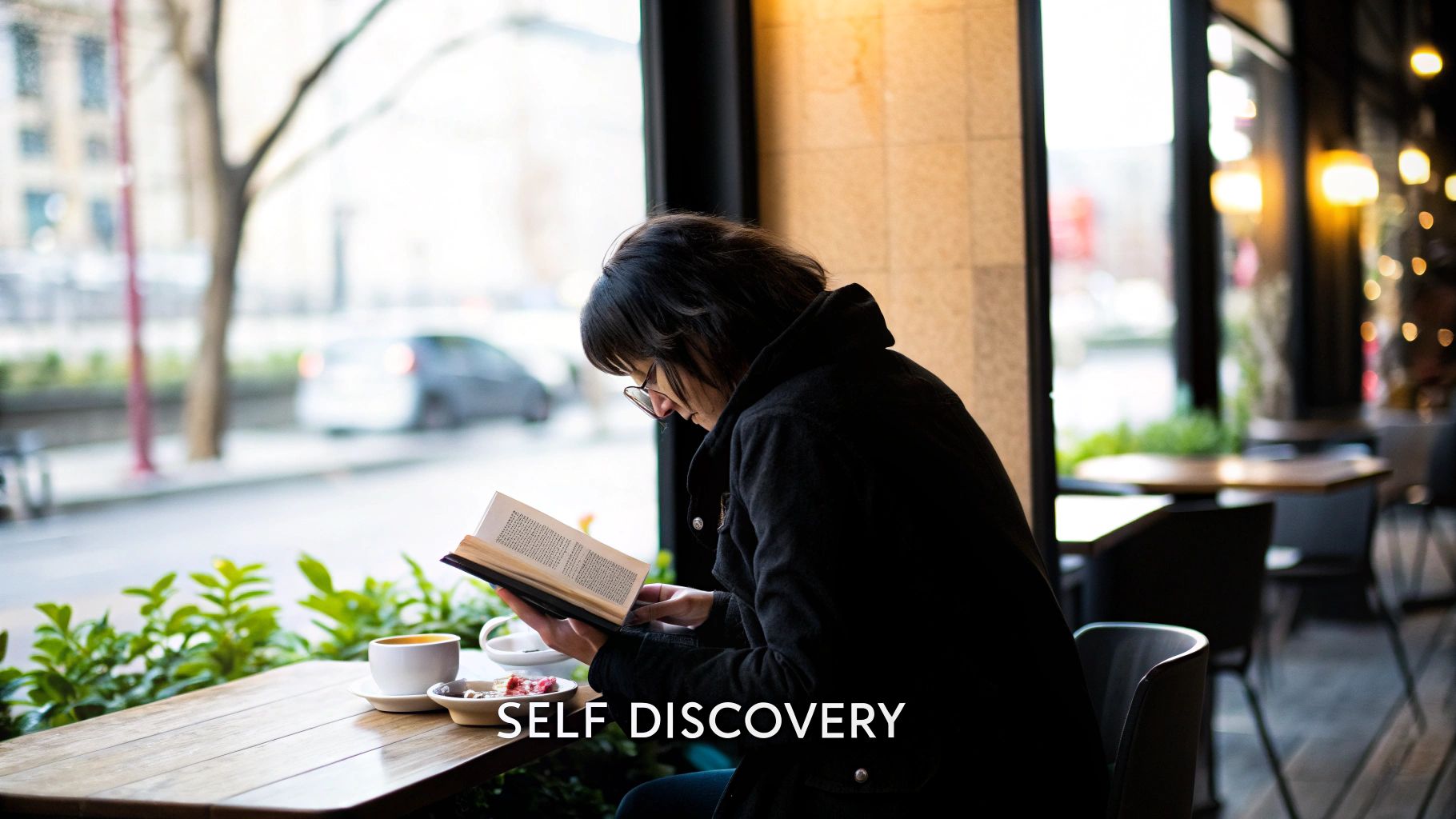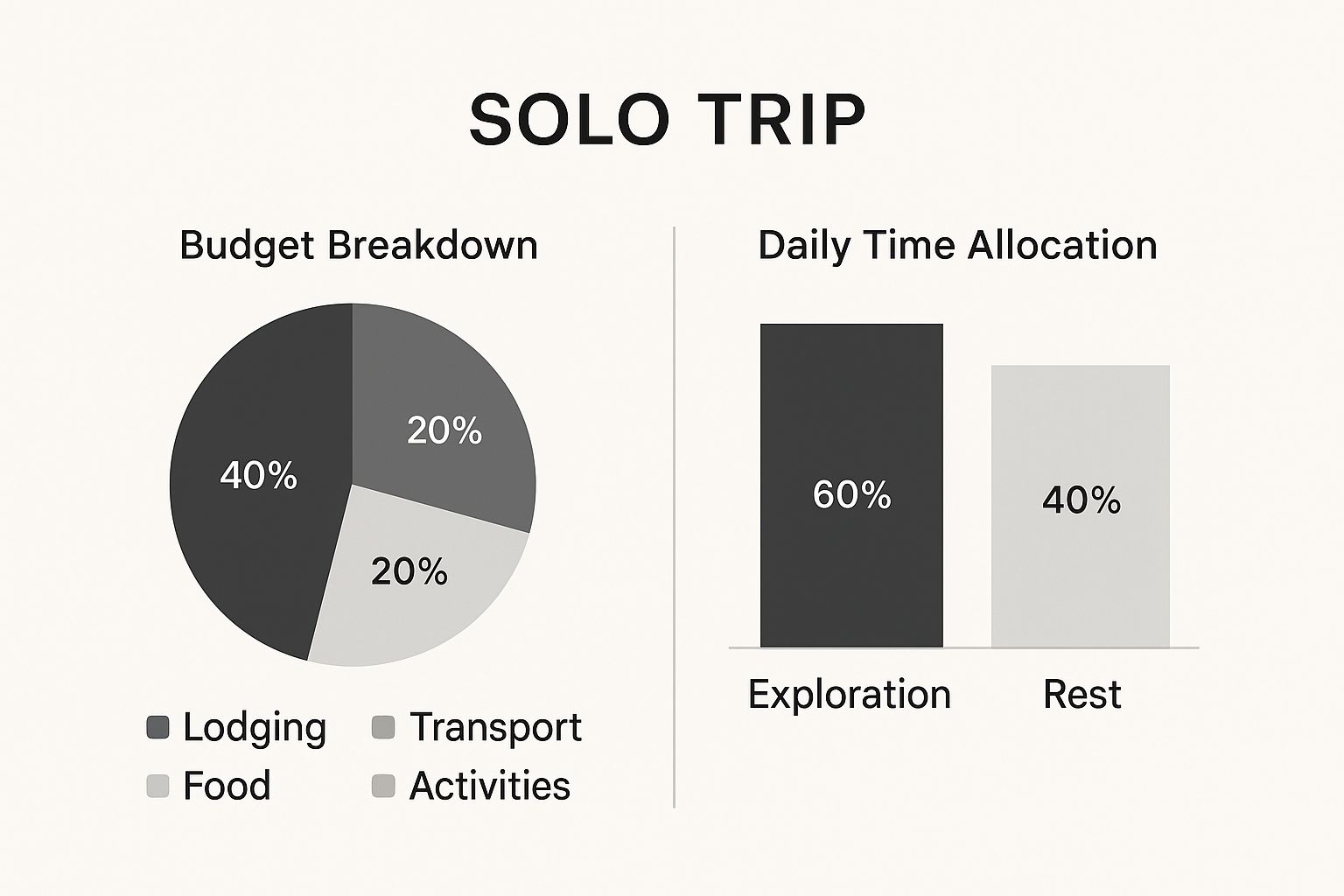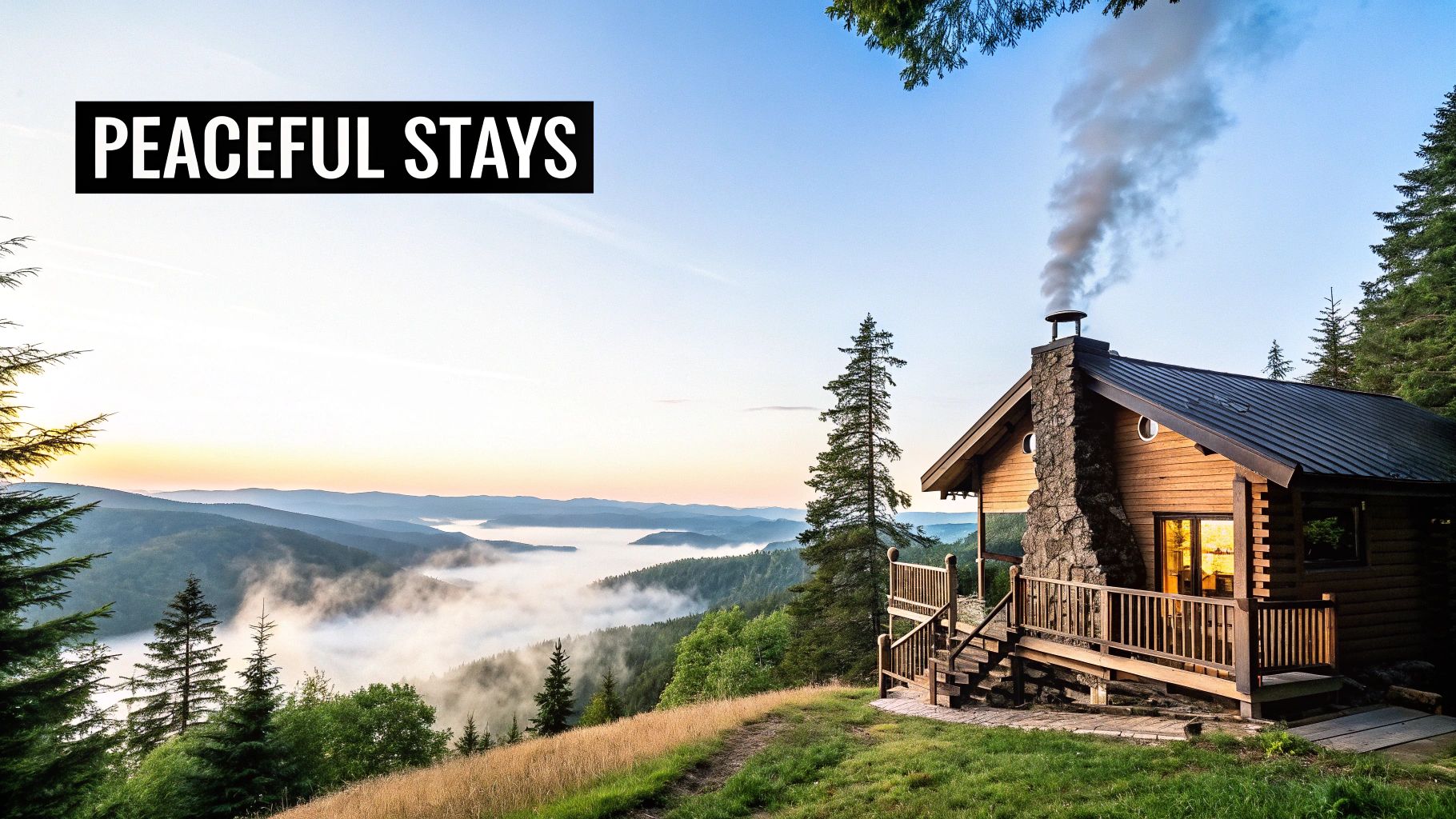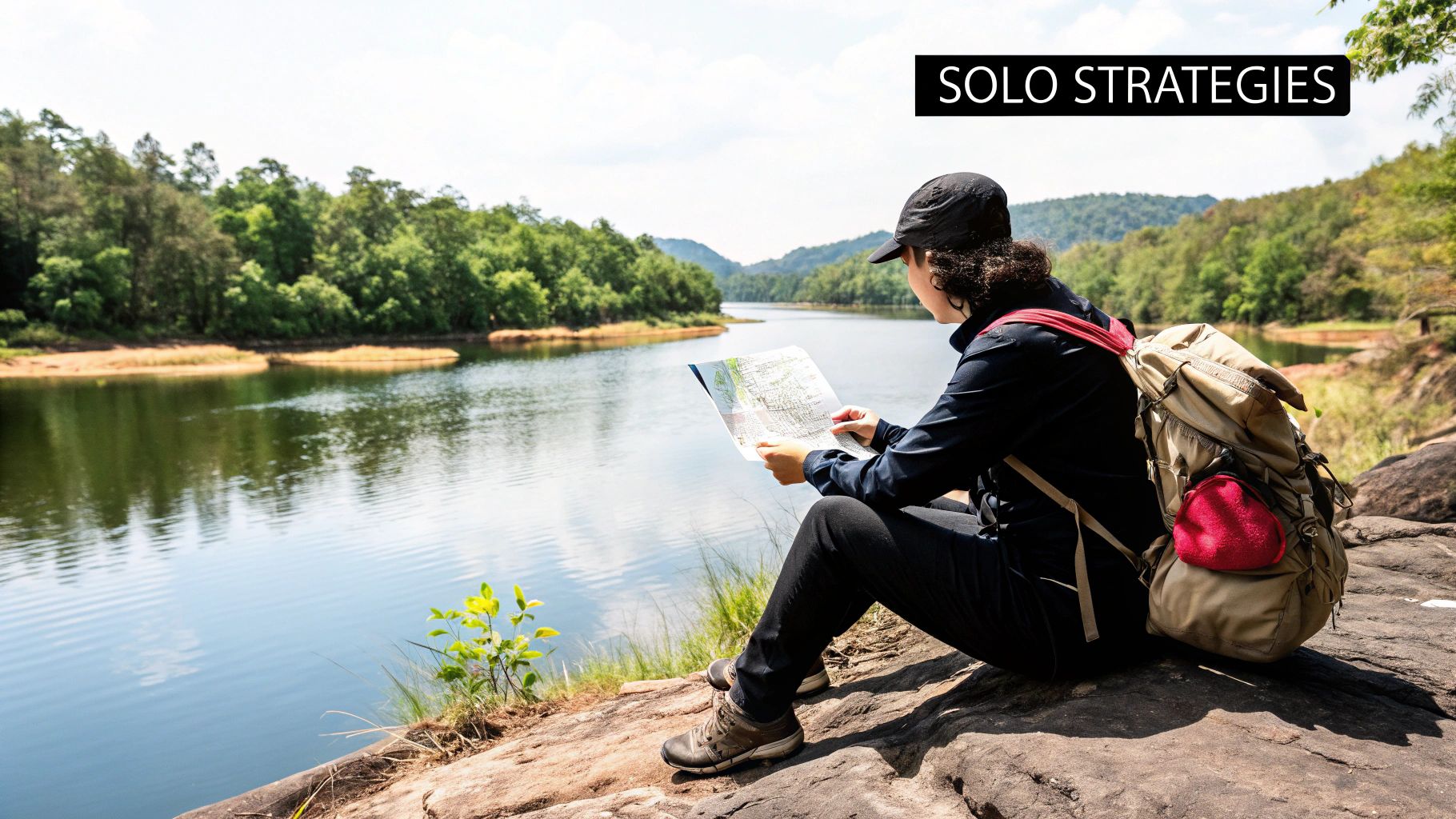Last Updated on
Why Introverts Thrive as Solo Travelers

Solo travel offers introverts a unique opportunity to recharge and explore at their own pace. It’s a chance to embrace solitude, not as isolation, but as a path to self-discovery and personal growth. This natural fit between introversion and solo travel allows individuals to craft experiences aligned with their strengths.
Embracing Solitude and Freedom
For many introverts, the daily demands of social interaction can be draining. Solo travel provides a welcome escape from these pressures, offering the freedom to set your own schedule and choose your social interactions. This autonomy lets introverts engage with new places at their own speed, savoring quiet moments of reflection without feeling rushed.
This means introverts can truly immerse themselves in the local culture. They can observe the details and make connections that might be missed in a group. When traveling solo, especially internationally, reliable internet access is key. Consider options like portable wifi for travel to stay connected while maintaining your personal space.
Turning Inward for Deeper Connection
Solo travel encourages introverts to connect with their inner selves. Free from the constant buzz of conversation, they can focus on their thoughts and feelings, gaining a deeper understanding of their values and aspirations. This self-reflection can be incredibly powerful, leading to increased self-awareness and personal growth.
It also creates the space to engage with new places using their natural strengths: deep observation, thoughtful reflection, and meaningful, selective interactions. For more travel tips, you might find helpful resources here.
The Growing Trend of Solo Travel
The rise of solo travel reflects a broader cultural shift towards independence and self-reliance. The solo travel market has seen a 42% increase in participants in the last two years. Women are leading this trend, with 84% of solo travelers identifying as female, according to 2023 data.
Studies show internal motivators like freedom, escape, and bravery drive this trend, highlighting the desire for transformative experiences and self-discovery. Over a third of British travelers now prefer solo trips, aligning perfectly with the introvert’s need for unstructured time and solitude. This flexibility fosters self-reflection and personal growth, as noted in travel psychology analyses linking solo journeys to positive outcomes. Learn more about the psychological benefits of solo travel here. This growing acceptance of solo travel creates a supportive environment for introverts to embrace their travel style and enjoy the unique benefits it offers.
Crafting Your Perfect Solo Journey: The Introvert’s Blueprint
The difference between an overwhelming trip and a rejuvenating solo adventure for an introvert often comes down to planning. This involves designing a journey that balances exploration with essential solitude. Let’s explore practical strategies introverts can use to create a truly fulfilling travel experience.
Researching Introvert-Friendly Destinations
The first step in crafting your perfect solo journey is selecting a destination that aligns with your introverted nature. This doesn’t necessarily mean escaping to a remote wilderness, though that’s certainly an option! Instead, consider locations known for their tranquil atmosphere, such as peaceful gardens, quiet museums, or less-crowded historical sites. For example, a bustling city like Rome might seem overwhelming, but exploring the serene Borghese Gallery and Gardens can offer a welcome respite.
Additionally, research local culture. Some cultures are naturally more introverted, valuing personal space and quiet contemplation. Understanding these cultural nuances can help you feel more comfortable and less pressured to engage in constant social interaction.
Accommodations and Itineraries Designed for Solitude
Choosing the right accommodation is crucial for introverted solo travelers. While hostels can be great for extroverts seeking social connections, introverts might prefer the privacy of a single hotel room, a quiet Airbnb, or even a secluded cabin. This allows for essential downtime to recharge after a day of exploring.
Similarly, building flexibility into your itinerary is essential. Rigid schedules can quickly lead to overwhelm. Instead, create a loose framework with plenty of room for spontaneous detours and downtime. This means that if a planned activity feels too draining, you can easily adjust your plans without feeling guilty.
Managing Potential Overwhelm
Even with the best planning, unexpected situations can arise. Identifying potential overwhelm triggers beforehand is key. Is it large crowds? Constant noise? Unfamiliar social situations? Once you know your triggers, you can develop personalized contingency plans.
For example, if crowds are a trigger, research less-visited times for popular attractions or seek out quieter alternatives. Packing noise-canceling headphones can be a lifesaver in bustling environments. And if unfamiliar social situations cause anxiety, having a few pre-planned conversation starters or polite exit strategies can ease the pressure.
Balancing Exploration with Recharge Time
A successful solo trip for an introvert balances exploration with essential recharge time. This means being mindful of your energy levels and scheduling regular breaks throughout the day. Think of your social energy like a phone battery: Engage, then recharge.
The following data chart visualizes how an introvert might structure their day to maximize both exploration and essential downtime.

This bar chart clearly shows how prioritizing lower-energy activities allows for a recharge period before and after more demanding excursions. The data underscores the importance of balancing high-energy activities with low-energy downtime.
To help you choose a destination that caters to your introverted needs, we’ve compiled a comparison table showcasing a few popular options.
Introvert-Friendly Destination Comparison
This table compares popular travel destinations based on factors that matter to introverts, including crowd levels, quiet spaces availability, and opportunities for peaceful exploration.
| Destination | Crowd Level | Quiet Spaces | Solo-Friendly Activities | Best Time to Visit |
|---|---|---|---|---|
| Kyoto, Japan | Moderate | Gardens, Temples, Bamboo Forest | Tea ceremonies, Zen gardens, Hiking | Spring/Autumn |
| Copenhagen, Denmark | Moderate | Canals, Parks, Museums | Cycling, Exploring cafes, Visiting castles | Summer |
| Reykjavik, Iceland | Low | Geothermal pools, Hiking trails, Libraries | Northern Lights viewing, Whale watching, Exploring glaciers | Winter |
| Queenstown, New Zealand | Moderate | Hiking trails, Lakes, Gardens | Kayaking, Hiking, Stargazing | Spring/Autumn |
| Santa Fe, New Mexico | Low | Art galleries, Museums, Hiking trails | Exploring Native American culture, Hiking, Spa visits | Spring/Autumn |
This table highlights the diverse range of introvert-friendly destinations, from bustling cities with pockets of tranquility to naturally serene landscapes. Choosing a destination that aligns with your personal preferences is key to a fulfilling solo journey.
The Power of Solitude: Psychological Rewards of Solo Travel

Solo travel offers introverts a unique way to embrace solitude, not as isolation, but as a tool for personal growth. This dedicated time for self-reflection, away from the daily demands of social interaction, can be incredibly restorative and insightful. Let’s explore the psychological benefits introverts can gain from venturing out on their own.
Enhanced Self-Awareness Through Introspection
Solo travel provides the ideal setting for introspection. Free from external social pressures, introverts can focus inward, exploring their thoughts and feelings on a deeper level. This dedicated self-reflection often leads to a better understanding of personal values, strengths, and areas for personal development.
Imagine hiking a peaceful mountain trail. The solitude allows you to connect with nature and with yourself, fostering a deeper appreciation for both. This quiet time can bring clarity to personal questions and doubts, ultimately leading to a stronger sense of self.
Building Confidence Through Navigating Uncertainty
Traveling alone inevitably means navigating unfamiliar situations. For introverts, this can be an opportunity to build resilience and confidence. Successfully managing unexpected challenges, from language barriers to missed connections, builds self-reliance and strengthens problem-solving skills.
These small victories add up, resulting in a greater sense of competence and adaptability. Solo travel encourages introverts to step outside their comfort zones in a positive way. It allows them to embrace the unknown and trust their instincts, which ultimately boosts their confidence in handling life’s uncertainties. For practical tips and strategies, check out How to master solo travel planning.
The Rejuvenating Power of Controlled Solitude
Introverts can use the solitude inherent in solo travel for psychological rejuvenation. A key benefit lies in the unstructured time spent in transit—train journeys, flights, or even delayed connections—which introverts often use for reading, journaling, or simply observing the world around them.
Travel experts note that introverts flourish in the anonymity of solo journeys, where they can control their level of social engagement. Interestingly, 60% of solo travelers feel the travel industry doesn’t fully cater to their needs (Mintel, 2018), suggesting a potential for introvert-focused offerings like silent retreats or intimate workshops. Recent studies also indicate that shy travelers use solo trips to practice social skills in low-pressure settings, gradually gaining confidence through brief interactions with fellow travelers. Learn more about this here. This controlled solitude allows for a recharge from the demands of everyday life, leaving travelers feeling refreshed and energized.
Deepening Travel Experiences Through Reflection
Introverts are naturally drawn to thoughtful observation and reflection. This allows them to process travel experiences on a more profound level, deriving greater meaning and lasting impact from their journeys. By setting aside time to journal, meditate, or simply contemplate their experiences, introverts can integrate their travel insights into their lives back home.
This deeper engagement creates richer memories and fosters a stronger sense of connection with the places they visit. It becomes less about simply seeing the sights, and more about truly experiencing them.
Connecting on Your Own Terms: The Introvert’s Social Strategy
Connecting with others while traveling solo doesn’t have to be overwhelming for introverts. It’s about discovering ways to engage socially that respect your need for solitude and time to recharge. This means developing a social strategy that allows for enriching interactions without feeling drained.
Embracing Meaningful Interactions
Introverts often prioritize quality over quantity in their social connections. Instead of feeling pressured to constantly socialize, focus on creating opportunities for meaningful interactions. This might involve striking up a conversation with a local artisan, sharing travel stories with someone in a quiet cafe, or joining a small group tour centered around a shared interest. These deeper connections can be much more fulfilling than superficial small talk.
For example, instead of a large, crowded bus tour, consider a smaller walking tour focused on a specific historical period or artistic movement. This provides a natural setting for conversations with like-minded people without the pressure of constant interaction.
Utilizing Technology to Connect
Technology can be a valuable tool for introverted solo travelers. Apps designed for connecting travelers can help you find people who share your interests. These platforms offer a way to initiate contact on your own terms, allowing you to connect with others at your own pace. Travello is a good example of such a platform.
Additionally, online forums and social media groups focused on solo travel can offer valuable insights and advice from experienced travelers. This allows you to learn from others and develop a sense of community before even starting your journey.
Setting Boundaries and Managing Social Energy
Learning to set boundaries is essential for maintaining a healthy social balance while traveling solo. It’s perfectly acceptable to politely decline invitations or excuse yourself from conversations when you need some alone time. This means being mindful of your social energy levels and prioritizing activities that help you recharge, such as reading, journaling, or simply enjoying some quiet time in nature.
Think of your social interactions as a series of choices, not obligations. Just as you would choose which sights to see or which restaurants to try, you can choose when and how to engage socially.
Finding Your Social Sweet Spot
Gen Z travelers are changing solo travel norms: a 2019 survey found one-third prefer traveling alone, while nearly 20% express interest in solo backpacking or gap years. The demographic’s focus on authentic, self-directed experiences aligns with introverts’ preferences for deep, meaningful interactions over forced group dynamics. Industry reports highlight this shift, showing solo travelers averaging 19-day trips—longer than other traveler types—and 52% showing interest in escorted tours that balance socializing with alone time. This caters to introverts seeking optional companionship without compromising their need for solitude. Find more detailed statistics here. This trend reflects the growing understanding that solo travel can be both an independent and socially enriching experience.
Accommodation and Activities for Introverts
Choosing the right accommodation can significantly influence your social experience. Consider options that offer a balance of connection and privacy. A guesthouse with a communal kitchen might offer chances for casual interactions, while providing the sanctuary of a private room for when you need to retreat.
Similarly, structured activities can offer a comfortable way to engage socially. Cooking classes, language exchange meetups, or volunteer opportunities provide natural conversation starters and shared experiences without the pressure of forced small talk. These settings offer a balance between structured social interaction and personal space.
Culture-Specific Social Strategies
Social customs vary significantly between cultures. Researching local etiquette can help you navigate social situations with greater confidence and avoid unintentional misunderstandings. Understanding cultural norms around personal space, greetings, and conversation starters can ease anxiety and enhance your interactions with locals. This allows you to connect with people on their terms, demonstrating respect for their customs while staying true to your introverted nature. This thoughtful approach creates a more fulfilling and balanced solo travel experience.
Perfect Destinations for the Introvert Traveler

For introverted travelers, finding the right destination can make all the difference. It’s about discovering places that offer both enriching experiences and the opportunity for peaceful solitude. This section explores some ideal destinations perfectly suited for introverts, highlighting locations that balance quiet reflection with meaningful engagement.
Nature’s Retreats: Embracing Tranquility
Connecting with nature is often a rejuvenating experience for introverts. Natural landscapes offer an escape from the overstimulation of busy urban life.
The tranquil beauty of Iceland, with its geothermal pools and glaciers, can be incredibly restorative. Similarly, Kyoto’s serene gardens and bamboo forests provide a sense of calm and peace. These natural havens allow introverts to recharge and reconnect with themselves.
Cultural Immersion Without the Crowds
Exploring new cultures is a rewarding part of travel, but crowded tourist attractions can be draining for introverts. Fortunately, there are many destinations that offer cultural immersion in a less overwhelming environment.
Copenhagen, with its charming canals and cozy cafes, boasts a laid-back atmosphere perfect for quiet exploration. Santa Fe, New Mexico, offers a rich artistic heritage and a unique cultural experience without the hustle and bustle of larger cities. For tips on avoiding crowds, check out our guide on mastering solo travel planning.
The Rise of Slow Travel: Deeper Engagement
Slow travel is a travel style that emphasizes mindful exploration and deeper engagement with local communities. It’s an approach particularly well-suited to introverts.
Slow travel prioritizes quality over quantity. This allows travelers to truly savor a destination’s unique character, rather than rushing between attractions. The picturesque Tuscan countryside or the charming villages of the Cotswolds in England offer ideal settings for embracing this philosophy. Slow travel fosters authentic connections with local culture, creating a richer and more meaningful travel experience.
Cities With Green Escapes: Finding Urban Oasis
Even in bustling cities, introverts can find pockets of tranquility. Many urban areas offer green spaces where you can escape the city noise and crowds.
Central Park in New York City provides a welcome respite from the city’s fast pace. London, with its numerous parks and gardens, offers a similar opportunity to unwind and recharge. These urban oases provide valuable breaks from sensory overload.
Specialized Programs: Developing Skills in Supportive Environments
For introverts interested in learning new skills, specialized programs provide a supportive and low-pressure learning environment.
Writing retreats, photography workshops, and cooking classes held in intimate settings can be deeply fulfilling. They offer a way to engage with your passions while connecting with like-minded people in a comfortable setting. These programs provide opportunities for social interaction without the pressure of large, unfamiliar groups.
To help you choose your perfect solo adventure, take a look at the table below:
Top Solo Activities for Different Introvert Types
This table categorizes various solo travel activities based on different introvert preferences and comfort levels with social interaction and new experiences.
| Introvert Type | Ideal Activities | Benefits | Considerations |
|---|---|---|---|
| Nature-Oriented | Hiking, camping, nature photography, visiting national parks | Solitude, reflection, connection with nature | Weather conditions, physical fitness level, potential for wildlife encounters |
| Culture Seeker | Visiting museums, art galleries, historical sites, attending local festivals | Learning, exploring new cultures, gaining new perspectives | Crowd levels, language barriers, cultural sensitivity |
| Urban Explorer | Walking tours, visiting cafes and bookstores, exploring parks and gardens | Discovering hidden gems, experiencing city life at your own pace | Noise levels, crowds, personal safety |
| Skill Developer | Attending workshops, taking classes, joining hobby groups | Learning new skills, personal growth, connecting with like-minded individuals | Cost, time commitment, level of social interaction |
This table provides a framework for matching your introvert type with activities that will resonate with you. Remember to consider your personal preferences and comfort levels when choosing your next adventure.
Tailoring Your Destination to Your Introverted Style
The ideal destination for an introvert depends on individual preferences. Some thrive in the solitude of remote wilderness areas, while others prefer the quiet charm of small towns or the cultural richness of less-crowded cities.
Factors like crowd levels, opportunities for solitude, and the availability of quiet spaces are essential to consider. Researching the local culture can also be helpful. Some cultures inherently value quiet and personal space, making them a more comfortable fit for introverted travelers. Thoughtful planning will help ensure a travel experience that is both rejuvenating and enriching.
Navigating The World Confidently As An Introvert Traveler
Safety is a natural concern for any solo traveler, especially introverts who might feel more hesitant about handling unexpected situations on their own. However, introverts have unique strengths in observation and planning that can be incredibly helpful for safe travels. This section explores practical strategies, drawing from safety experts and experienced introvert travelers, to empower you to travel with confidence.
Leveraging Introvert Strengths For Safety
Introverts are often naturally observant, picking up on details that others may miss. This heightened awareness can be a significant safety asset. By paying close attention to your surroundings, you can anticipate potential problems and take proactive steps to avoid them. For instance, locating exits in crowded areas or being mindful of those around you on a quieter street can increase your sense of security.
Introverts also tend to be meticulous planners. This strength becomes invaluable when preparing for a safe trip. Researching your destination, understanding local customs, and packing a comprehensive first-aid kit are just a few examples of how thoughtful planning contributes to a safer travel experience.
Practical Safety Protocols And Communication Strategies
While using your natural strengths is important, understanding established safety protocols is equally vital. This includes researching common scams at your destination, learning basic self-defense, and sharing your itinerary with someone you trust.
Effective communication is also essential. Knowing how to ask for help in the local language, setting clear boundaries with strangers, and having a plan for contacting emergency services can be crucial in navigating difficult situations.
Technology Tools For Enhanced Security
Technology can be a powerful tool for increasing travel safety without adding extra worry. GPS tracking apps can allow loved ones to know your location, and offline translation apps can facilitate communication in unfamiliar languages. However, it’s important to use technology thoughtfully. Over-reliance on devices can decrease your awareness of your surroundings, so find a balance between using helpful technology and staying present.
Building Confidence Through Progressive Solo Experiences
Confidence as a solo traveler often grows with experience. Starting with smaller, manageable trips, like a day trip to a neighboring town, can help you build the skills and self-assurance needed for bigger adventures.
As you gain experience, you can move on to weekend getaways and eventually longer international trips. Each successful solo experience strengthens your resilience and develops your ability to handle unexpected challenges. This process helps you differentiate between reasonable caution and limiting anxiety, allowing you to travel more freely and confidently.
Ready to plan your own peaceful adventure? GoTravelYourself.com is your ultimate resource for crafting personalized solo journeys that cater to your introverted nature, offering detailed guides, expert advice, and curated experiences designed for independent exploration. Start planning your next solo trip today!

Hi there! My name is Jenny, and I’m a travel writer who is endlessly curious about the world and always on the hunt for the next best-kept travel secret. My expertise lies in creating destination guides that enable you to travel smarter and especially if you travel solo.
My bylines have appeared on blogs, travel sites, and content agencies, and I’m always ready for the next adventure (and next great caffeine fix). In between assignments, you can find me trawling through a bazaar, sampling street food, or getting lost in an unfamiliar metropolis by choice.

